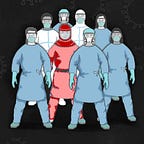The Economic Inequalities that Essential Workers Face
Elaine Wu | Berkeley, CA | UC Santa Barbara
According to the Bureau of Labor Statistics, unemployment has reached a record high in the pandemic, coming in at 14.7%. Meanwhile, those who are still working in the pandemic are at the highest risk of being infected by the virus due to their workplace not taking proper CDC guidelines. Thus, it is important to hold big corporations and the government responsible to create safer working conditions for essential workers to slow the spread, as well as redistributing the economic inequalities.
Many essential workers fall under the working class and are often working low-waged jobs that do not follow proper CDC guidelines. This includes social distancing, sanitizing stations, and wearing masks. According to the Los Angeles Times Communications, many low-wages workers are afraid to speak up about their unsafe conditions in fear of having cut wages, reduced hours, or even being fired. Jin, an essential worker at a factory said, “They used to take temperature checks every day, but they don’t that anymore. They don’t care. No one does.” She continues on to say, her company only provided the employees with one cloth face mask and if someone gets the virus, it is unpaid leave. Despite these conditions that she is given, she still feels obligated to go to work because she needs the money and she doesn’t feel comfortable enough to speak up. However, compared to the interview with Carlos who is currently a research scientist, he receives paid leave if he contracts the virus and his company has taken extra precautions by creating shifts for workers. If Carlos felt his work conditions made him uncomfortable, he said that he wouldn’t be afraid to speak up. The main difference between Jin and Carlos is the different social classes. As Jin is in the working class and Carlos is in the middle class. The social classes alone, shows the different work environment and different guidelines on taking safety precautions when working in the pandemic, and the need to speak up.
Essential workers usually fall into the category of the working class and most live on a paycheck to paycheck basis, so they cannot afford to be unemployed. The author and journalist, David Shipler, conducted a series of interviews throughout America to grasp why it is so hard for families who are constantly working to get out of poverty. From his research, he concluded that many of these families live in similar neighborhoods that disproportionately displaces them by location, followed up by race because of the underlying discrimination in the America. According to the Philadelphia Tribune, Latino and Black communities in America face the most inequalities that ranges from having higher rates of crimes, more food insecurity, lower income levels, and health inequalities. With the intersection of race and income in the pandemic, it has only brought out the underlying health inequalities people face. Although the virus does not discriminate across race and class, the health care system has shown it does discriminate with people not being able to receive medical attention they need because they cannot afford it.
A step in stopping the unsafe work conditions are work unions. Work unions have been proven to help with the work inequalities that workers face since it allows for a collective voice to speak up. According to the Economic Policy Institute, in the beginning of the pandemic, the Trump administration had failed to protect essential workers and citizens with barely providing people with the basics of protections such as PPE. Essential workers are at the highest rate of being infected by the virus because their work place does not take proper CDC guidelines. In order for change to occur, work unions are one of the places to go to so they can speak up about their work environment. It allows for workers to negotiate pay, take extra health and safety measures, and have paid leave. In order to help strengthen workers’ rights, it would be beneficial to alter the current National Labor Relations Act (NLRA) and pass the Protecting the Right to Organize (PRO) Act. This would help workers in the private sectors to form unions and for workers to refuse unsafe work conditions and still be eligible for UI benefits. In addition, these acts would hold both the state and big corporations accountable for their workers. Thus, help shrink the economic gap between the social classes and create a safer work environment for essential workers.
Although, the conducted interviews with Carlos and Jin does not quite provide enough insight to everyone’s work environment. It does provide a solid foundation for how well their companies handled the pandemic and gives an overview of what other essential workers could potentially face. Thus, in order for everyone to have a better and safer work environment, it is very important to hold the state and big corporations responsible with certain acts being passed. This would strengthen work unions to help protect essential workers, negotiate workers’ pay, and try to break the cycle of families being in constant poverty.
References
Arteaga, Carlos. Interview by Elaine Wu. Zoom call interview. California, Sunday, February 28, 2021.
Bracho- Sanchez, Edith. 2020. “How Black, Latino Children Came to be most Affected by COVID-19.” Philadelphia Tribune, Sep 08. https://search-proquest-com.proxy.library. ucsb.edu:9443/newspapers/how-black-latino-children-came-be-most- affected/docview/2454188302/se-2?accountid=14522.
Li, Jin. Interview by Elaine Wu. Phone interview. California, Sunday, February 28, 2021.
McNicholas, Celine, Lynn Rhinehart, Margaret Poydock , Heidi Shierholz, and Daniel Perez. “Why Unions Are Good for Workers-Especially in a Crisis like COVID-19: 12 Policies That Would Boost Worker Rights, Safety, and Wages.” Economic Policy Institute, August 25, 2020. https://www.epi.org/publication/why-unions-are-good-for-workers-especially- in-a-crisis-like-covid-19–12-policies-that-would-boost-worker-rights-safety-and-wages/.
Miller, Leila. “Low-Wage Workers Face Retaliation for Demanding COVID-19 Safety Measures at Work.” Los Angeles Times Communications LLC, last modified Aug 15.
Nova, Annie. “The Pandemic Is Driving Millions of America’s ‘Working Poor’ to the Edge.” CNBC. CNBC, September 19, 2020. http://www.cnbc.com/2020/09/19/coronavirus-how- the-pandemic-impacts-americas-working-poor.html.
